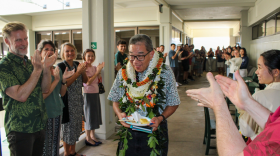Under the American Rescue Plan, $115.5 million is coming to Hawaiʻi for high-speed internet projects.
About $101 million will go toward improving the sub-sea cable infrastructure throughout the state.
“As the most isolated populated place on the planet, we face unique communications challenges and rely on submarine cables to stay connected,” U.S. Sen. Brian Schatz said. “Improving our submarine cable infrastructure to ensure Hawai‘i remains connected to the world and everyone in the state can get reliable, high-speed internet has been a focus of mine, and this funding will help make that a reality.”
Internet is the great equalizer, Sen. Mazie Hirono said, noting that the pandemic highlighted the connectivity divide in health care access and education.
"The learning loss of our kids during that period would be even greater for this group of kids who ended up having to go to the Zippy's parking lot to get access to the internet," she said.
These upgrades build on state initiatives to increase rural connectivity access. Gov. Josh Green said about 30% of the state’s population is geographically isolated, which amounts to about 400,000 people.
“The pandemic showed that there are access disparities in Hawai‘i, to affordable and reliable internet service,” Green said in a release. “I thank President Biden and his administration for providing federal resources to help our state improve internet access for all residents. High-speed internet is critical for education, telehealth services, job opportunities and information.”
About $8 million will go toward upgrading the internet in public affordable housing complexes.
U.S. Rep. Ed Case, who represents urban Honolulu, said broadband access isn’t just a rural issue.
"Lack of connectivity can lead to under-representation in disadvantaged communities," Case said. "So for us to be reinvesting even in an urban environment, in our public housing, and to try to get those public housing projects really, fully into the world of modern-day accessible, affordable connectivity is a great part of this project. "
The University of Hawai‘i worked with the Department of Budget and Finance to submit a grant plan for the two programs to the U.S. Department of Treasury last year.
The federal funding on these two projects must be spent by 2026.






